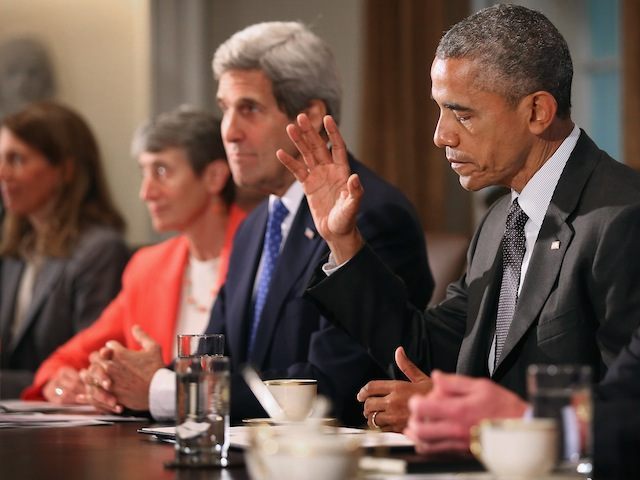President Barack Obama and Secretary of State John Kerry are highlighting the history-making qualities of their proposed Iran deal, and that’s the one thing they got right: this deal makes history.
This deal reflects a profound shift away from the way America deals with dictatorial regimes– in this case, Iran, the largest state sponsor of terrorism on the planet. This deal rewards Iran to the tune of hundreds of billions of dollars that will allow them to continue conduct business as usual, giving nothing up in return.
The sanctions Iran has been living under are not some arbitrary measures to punish a country without reason. Congress passed many of these sanctions and others were approved by a UN Security Council that included China and Russia. The billions of dollars in sanctions relief in this deal mean that we have essentially chosen to fund an Iranian revival that creates a new superpower in the region.
The biggest beneficiaries of President Obama’s foreign policy in his tenure have been Vladimir Putin, Fidel Castro, and, now, the Ayatollahs in Iran.
This deal reinforces a corrupt regime that violently suppresses democratic tendencies exhibited by its own citizens, like the “green” protests of 2009 or the student revolution of 1999.
This deal does nothing to bring Iran to account for its imprisonment of U.S. citizens and journalists. Pastor Saeed Abedini, former FBI and DEA Agent Robert A. Levinson, USMC veteran Amir Hekmati, and Washington Post bureau chief Jason Rezaian continue to sit in Iranian prisons, and there have been repeated claims that their incarcerations are part of Iran’s comprehensive and ongoing play to get the US and her allies to lift sanctions.
Why have President Obama and Sec. Kerry failed to fight for the release of these men who desperately want to be reunited with their families? When President Ronald Reagan traveled behind the Iron Curtain, he made a point to speak to human rights activists. By contrast, Sec. Kerry simply meets with the sponsors of terror, makes nice with them, and mentions human rights abuses as a formality only after a deal has been struck. That’s not a negotiation: that’s throwing in the towel.
I cannot imagine what Iran might have told Sec. Kerry to make him believe that the “Death of America/Israel” crowd can trusted to abide by the conditions in the proposed deal. As a Senator, John Kerry’s repeatedly sought to diminish American sovereignty and to make America subservient to unelected, multinational organizations. In his 2003 book A Call to Service, he claimed the Republican foreign policy strategy was dangerous, and that he instead supported “multilateral cooperative internationalism.” In a 2004 presidential debate, he stated that any U.S. preemptive strike must first be approved on the international stage. Sec. Kerry’s career has been one of apologizing for American action since he began his career as an anti-war protestor in 1971.
The truth is that, once again, we have sacrificed generations of accumulated American strength for the sake of this administration’s apologies and continued concessions to tyrants.
President Obama should have worked first with Congress to find a solution that had more widespread public support, but as is this administration’s approach on everything, President Obama sought to check another box on his fundamental transformation checklist with the stroke of a pen, rather than work with the Congress to reach a deal that would pass the Senate with bipartisan support.
President Obama is fine with Iran having a domestic nuclear capability and building a nuclear plant but, through the power of the executive branch, has made building the same in America virtually impossible. The financing process for new power projects, run through the Office of Management and Budget (OMB), discriminates against nuclear proposals while indiscriminately funding the pet projects of radical environmentalists who funded Obama’s two campaigns for president.
The president thinks it is good politics to allow the least-safe possible country to possess materials that could be turned into weapons within a decade—regardless of what assurances they may put forth today. The bottom line is that Iran has been at war with the United States for the last 36 years, and we have just allowed them to declare victory so that this president’s memoirs can wax poetic about how he worked toward peace in the Middle East.
But at what expense? We should all be very concerned by the unintended consequences of this deal. The Senate and the American people have 60 days to go through the deal and have a vigorous debate on the correct approach.
President Reagan spoke of achieving “peace through strength.” This proposed deal sadly does not reflect American strength. In a very dangerous and volatile region, it unfortunately brings us closer to armed conflict and bloodshed.
Matt Schlapp is chairman of the American Conservative Union.

COMMENTS
Please let us know if you're having issues with commenting.